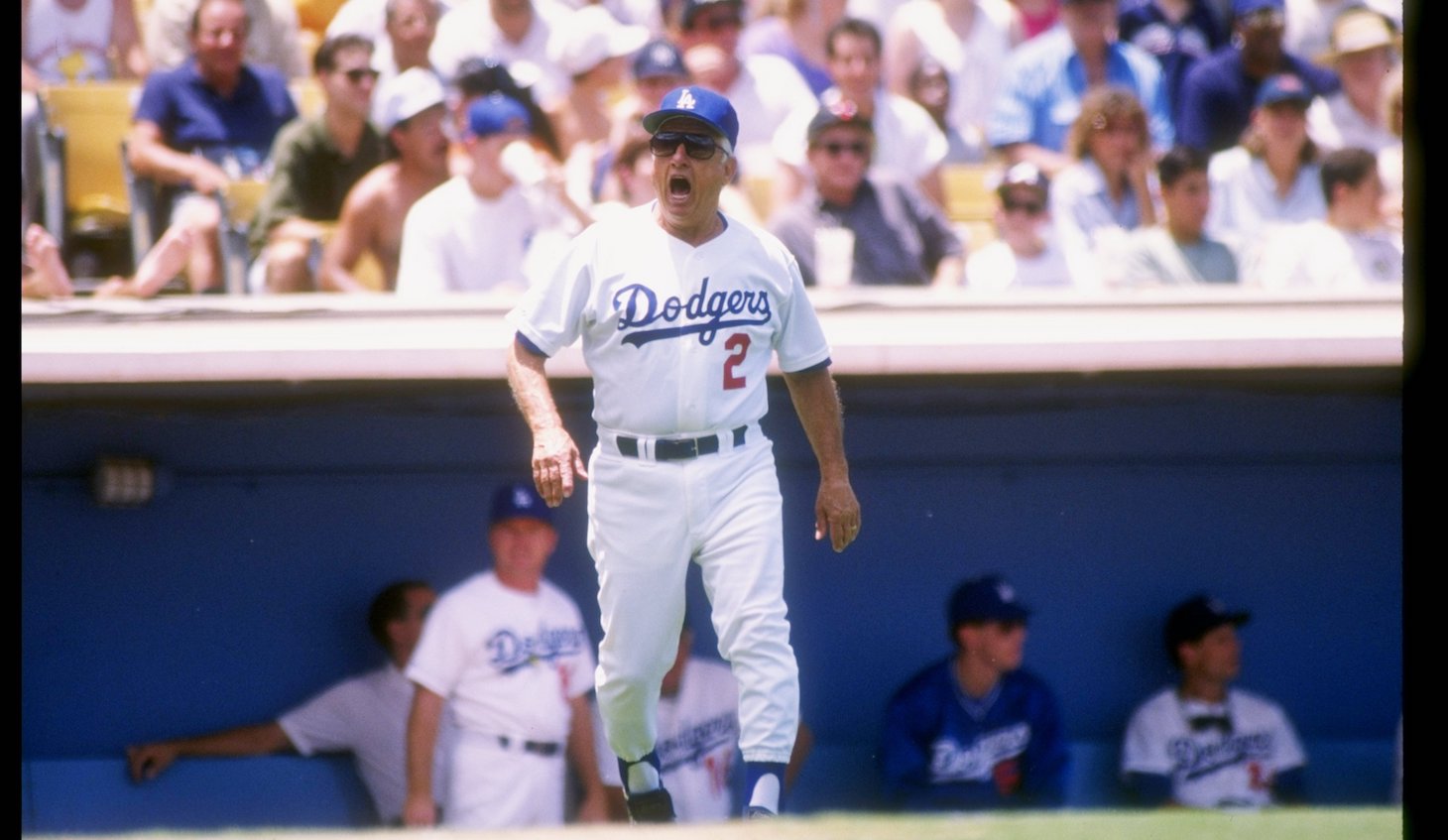Tommy Lasorda died this morning at age 93 as one of the most prolific managers in baseball history, and by prolific, I mean the manager who most managed to get himself noticed by other folks. He won two World Series and four National League pennants, proselytized shamelessly for the Los Angeles Dodgers, and made himself the center of attention for each of the 21 seasons he managed. He was, in that way, the last of his line.
Maybe Tony La Russa could still be placed in this category, but he never shone as brightly or with as much duty-bound narcissism as Lasorda. He was, for good, ill, and value-neutral, Dodger Blue at its most successful and obnoxious.
Managers have been slowly but surely been reduced as figures in baseball. They have to meet the media twice every day, but their decision-making powers have been steadily reduced by MIT's army of B-plus-students/general managers. They have to ask permission to argue with umpires. They get their lineup cards from someone upstairs. They talk in measured, almost robotic tones. They live in an increasingly shrinking escape artist's box, with more of the unpleasant duties (media relations) and fewer of the fun ones (running a baseball game).
But Lasorda worked very hard at being bigger than life. Of all the images of him over the years, getting in an actual fight with the Phillie Phanatic was the comedy, but walking out of the right field tunnel at Candlestick Park to a nightly tsunami of hysterical and menacing boos and a forest of middle fingers while he held his arms aloft and asked for more is the pomp and pageantry. He was selling the game in the good old-fashioned way, and he sold himself just as hard. He wanted stardom, he had teams and a city that gave it to him, and he worked it like a three-shows-a-night exotic dancer.
He was also richly flawed in that grew-up-too-many-years-ago way. He was often a bully when he could get away with it, to players on his team, umpires, medioids, and even supervisors, and only occasionally used his charm to reel them back. His behavior toward his son, who was gay, was unconscionable; Tom Jr., who died in 1991, died of AIDS, which his father denied aggressively to anyone who asked, including author Peter Richmond. Their relationship was tortured during his son's life, and he was combative to anyone who wanted to broach the subject. He was, in short, a louder version of many fathers in America in the '60s and '70s, though he and the rest of the family was at his son's bedside at the end. He loved his son and hated the position in which he believed his son had put him in the world in which he worked.
And the world in which he worked was a stage. He was among the last managers who coached third while managing, though he did it only sporadically and is known best for tumbling theatrically backward. He perfected the old form of the postgame interview, and you can't find a radio reporter in America who can't call up his Dave Kingman three-home-run soundbite in nanoseconds. He was in many ways a self-styled cartoon, but it was all part of a greater strategy to promote both the game and his place in it.
Lasorda could not have survived in the game as it currently exists. He would not have been hired as a scout, let alone a manager. He was in every way what baseball is renouncing as it becomes less nationally resonant and more adamantly scientific. He could not muscle today's players the way he did his own; by comparison, Tony La Russa is going to emerge as Generation Z with the personality-enriched Chicago White Sox. Even his silhouette is considered unacceptable in the new baseball, where "selling the game" means doing exactly none of the things Lasorda did to sell the game, and undoing them with a 180-degree level of inflexibility. He would not be permitted to be the things that made him remembered.
And the problem we have in referencing his career is that his methods of doing his job, which were more than sufficient for him to succeed at his job for more than two decades don't translate to the new baseball, or in the new terms of civil discourse. Tommy Lasorda was the last over-the-top manager-actor, and until baseball can loosen the grip on the humorless spreadsheets with feet who operate the game now, he will be the last.






